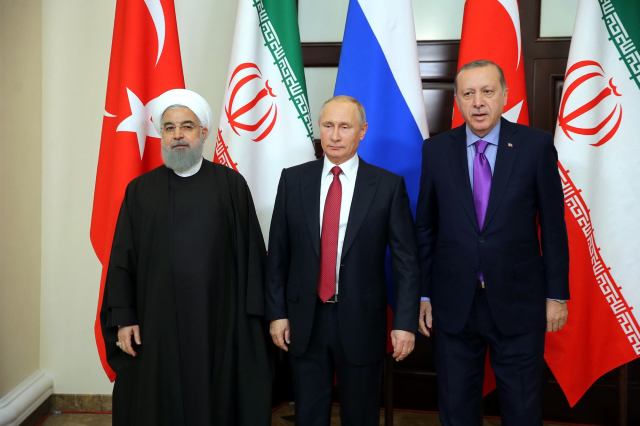Credit: Parspix/ABACA/ABACA/PA Images

As the tragic Syrian civil war enters its seventh year, the British media can be commended for keeping the war in the headlines, especially in terms of spotlighting regime atrocities against civilians. The media has also capably covered two major unintended consequences of this relentless war: the massive migration flows that surged across Europe in 2015-16 as well as the growth of the so-called Islamic State, which metastasized in Iraq and Syria due to the civil war.
What has been under-reported, however, is the quiet transition of leadership on the peace process. The United States and the United Kingdom spearheaded efforts from the start of the war until very late in the Obama presidency. Today, Russia, Iran and Turkey are now in pole position, leading the Astana Process. Who can reasonably argue that Russian and Iranian aspirations for a post-war Syria will cohere with those of the West, and especially the Syrian people?
President Trump inherited this situation from President Obama, who did not exert enough energy to end the conflict, wary as he was of getting the United States bogged down in another Iraq-like war or even another Libya, after the NATO bombing campaign. He held fast to this commitment, even after Asad crossed the red line in Autumn 2013. Yet, one lesson that should have been learned years ago – in Afghanistan, Somalia and elsewhere – is that we ignore (or discount) unpleasant parts of the world at our peril. As the war in Syria dragged on, nasty side-effects of the conflict festered, and spread further afield. In addition to the migration crisis, hundreds of civilians have been killed and injured in several dozen ISIL-inspired and ISIL-directed attacks in Europe and North America. Populist politicians in Europe and the United States deftly exploited these issues to their benefit.
President Trump has in fact continued the Obama policy of taking a back seat, despite his one-off event of launching 59 Tomahawk missiles on a Syrian air base near Homs in April 2017. This was not followed by any meaningful diplomatic push to get all parties to the table and promote a fair settlement. Instead, he too stepped back, while Russia, Iran and Turkey have deftly manipulated the situation to their advantage.
***
Introduction to this Under-reported series.
Summary guide to all under-reported articles in this series.










Join the discussion
Join like minded readers that support our journalism by becoming a paid subscriber
To join the discussion in the comments, become a paid subscriber.
Join like minded readers that support our journalism, read unlimited articles and enjoy other subscriber-only benefits.
Subscribe